On the heels of Washington State’s pioneering efforts to identify local steps to slow ocean acidification, Sen. Kevin Ranker (D-Orcas Island) has introduced legislation to begin coordinating that response. SB 5547 would create a new council of elected and tribal representatives and affected industries to oversee research and action to curb profoundly troubling changes in ocean chemistry.
The bill would also include acidification as a possible justification for extending urban sewer services to rural areas (normally not allowed under the state’s Growth Management Act), in areas where local pollution from leaky septic systems combines with global carbon dioxide emissions to make the problem worse.
As seawater becomes more acidic, tiny creatures at the bottom of the food chain dissolve. Fish become confused. Young oysters die. While it’s impossible to predict all the ways that changing ocean chemistry will affect seafood supplies, and the hundreds of thousands of related jobs, Washington State leaders have recently recognized ocean acidification as a major problem for the state and mobilized to begin addressing it. (To get up to speed on the threat and solutions, see Sightline’s primer and blog series.)
Former Gov. Christine Gregoire last year assembled a blue-ribbon panel of scientists and policymakers to establish what we know about the problem, what we still need to learn, and come up with local responses. They settled on a long list of recommendations, including strategies to reduce carbon dioxide emissions (such as implementing a carbon tax or allowing people who drive less to get a break on car insurance).
Other local pollution can make the problem worse. Nutrients from leaky septic systems or in stormwater washing off farms and yards and urban streets may be making some bodies of water significantly more corrosive. So the blue ribbon panel strongly supported efforts to quantify those contributions and to control polluted runoff. Ranker’s bill takes a first stab by adding acidification to the universe of public health and environmental problems that can be used to argue for extending sewer lines outside urban growth areas under extenuating circumstances.
The panel also recommended steps to help the struggling shellfish industry adapt to new realities, and identified many research projects that need to be funded. (Gregoire recommended in her outgoing budget that $3.3 million be dedicated to acidification science and policy work, including a new research center at the University of Washington.)
Ranker, who sat on the blue ribbon panel, said tackling ocean acidification cuts across state agencies, differing needs in Puget Sound and coastal areas, and scientific disciplines. He said the most basic need at this point is a structure to begin moving forward.
The biggest thing is that we don’t know who is going to do all this. This isn’t just the Department of Ecology, or Fish and Wildlife, or the University of Washington, or NOAA. This is everybody. So I think the most important thing we can do right now is create this council so that leaders…can have one stop shopping on how to advance this.
Ranker’s bill would establish the “Washington Marine Resources Protection Council” to coordinate acidification work and address broader ocean issues. The 21-member panel would include Washington’s governor and commissioner of public lands, heads of state agencies, tribal members, elected officials from Puget Sound and coastal areas, and representatives from fishing and marine industries. The council could also start getting ahead of other marine issues, such as the increasing number of uses proposed for ocean areas and the conflicts they create.
Much like the panel that preceded it, the marine council would also be another venue to begin educating local officials and creating buy-in for the politically difficult actions that the state must take if it hopes to see meaningful changes in acidification trends. Ranker said it was “extremely valuable” to have everyone from Weyerhaeuser representatives to shellfish farmers, Republicans to Democrats, sitting on the blue ribbon panel, getting up to speed on ocean acidification, and deciding collectively what actions the state should take.

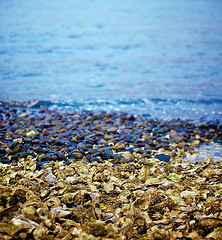
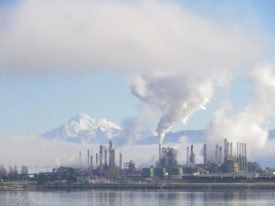
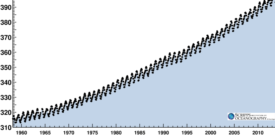
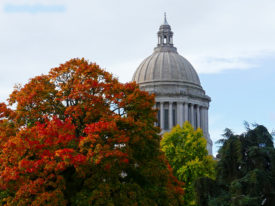

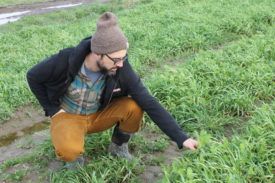

Serena Larkin
Couldn’t come soon enough! University of Chicago scientists, who have been studying acidification off of Tatoosh Island, WA, for the past twenty years, are next to positive that the blame falls squarely with increased atmospheric CO2 levels. Said one of the scientists, Dr. Cathy Pfister, “It really seems to be atmospheric carbon dioxide, and it’s doing something different than any of us understand it to be doing.”
Jay
Extending sewer into rural areas is bad idea (any expensive). This will just promote the expansion of urban growth into our rural areas. A better way would be to provide funding to help rural owners update to septics that work better.
Doug
The blue ribbon panel report had no idea the percentage of acidification caused by local nutrient inputs when compared with atmospheric contributions, other than it was small. Development follows sewer lines and the cost of sewering rural septic systems could easily run into the 10’s of millions of dollars. Is that the best use of public funds to address this critical environmental issue? Will the trade-off of increased development in rural areas and the increased levels of transportation be equaled by the theoritical reduction of nutrients from septic systems. And will this potential reduction result in reduced acidification in the Puget Sound?
Don
As for Puget Sound point source septic …don’t forget Victoria!
David Tucker
I am a climate scientist. Frankly, I find WA’s response to ocean acidification pathetic. The main source of the problem is burning fossil fuels in transportation and electric power generation. There is a powerful movement in the state legislature to eliminate or significantly reduce the requirement that our electric power suppliers (like Puget Sound Energy)use alternative energy fuels. End of statement.
When we passed the initiative to require electricity generation to include alternative fuels, the folks of WA state were sending a message. Now, the oil and gas companies and their electric generating friends are reneging on this requirement.
Why bother confusing the issue with small-scale items that are mentioned in your article. Carbon compounds must be reduced. Start there.
www
we are increasing the rate of carbon cycling by burning fossil fuels on the surface of the earth, making CO2 going to atmosphere, and it gets back to ocean. The best way is of course either stop burning the fossil fuels or making to CO2 sink to the bottom of the ocean faster. It seems hard to stop using fossil fuels. Question is how can we make the CO2 in ocean sink to the bottom and become part of rocks/dry ice/fossil fuels again buried there in a faster pace?